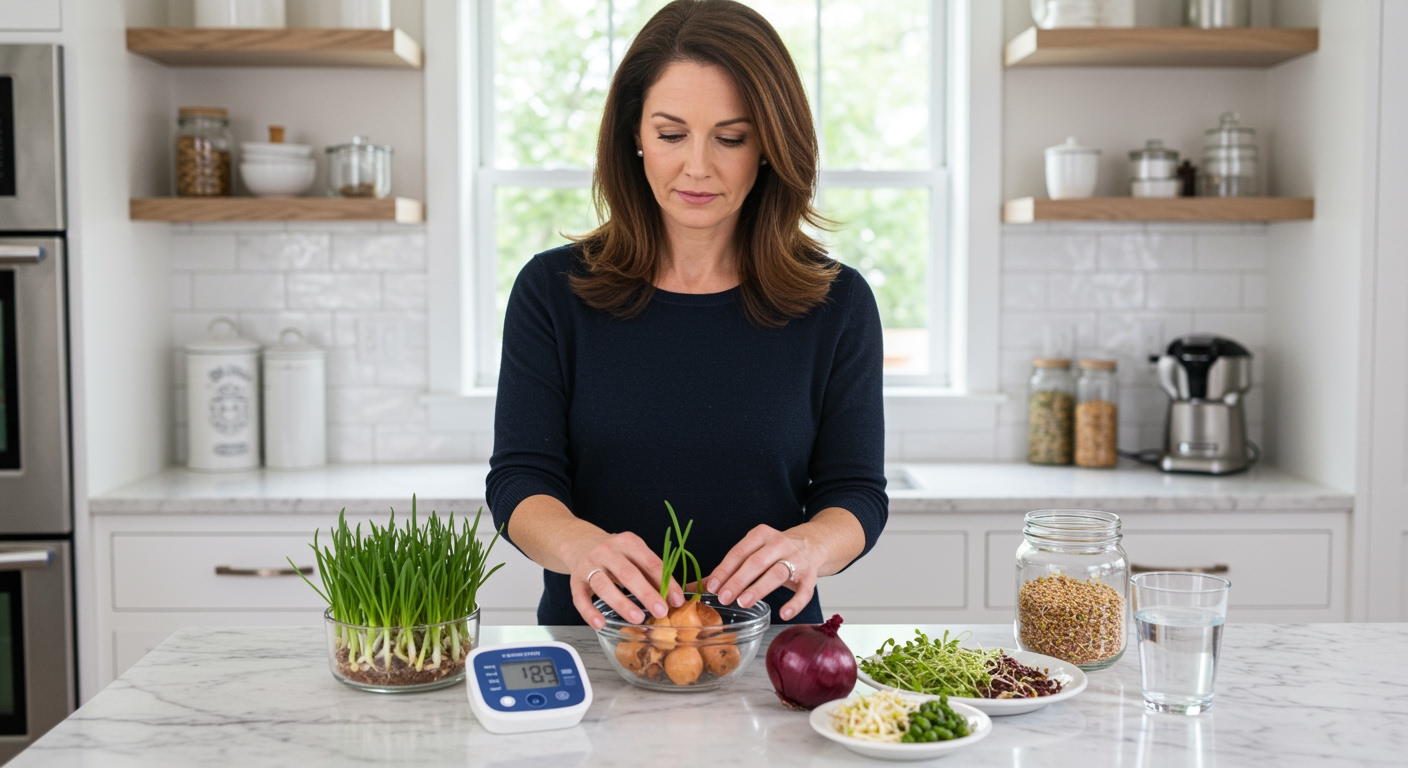✪ Key Takeaway: Onion sprouts can lower blood pressure, but they rarely cause dangerous hypotension in healthy people with normal eating habits.
Introduction
Your friend just told you that onion sprouts dropped her blood pressure so low she felt dizzy for hours.
Now you are wondering if these tiny green shoots could push your already low blood pressure into dangerous territory.
Hi, I am Abdur, your nutrition coach and today I am going to explain exactly how onion sprouts affect blood pressure and whether they pose real risks for people with hypotension.
What Makes Onion Sprouts Different From Regular Onions?
Onion sprouts contain concentrated levels of bioactive compounds that regular onions have in smaller amounts.
The sprouting process increases the production of quercetin, a powerful flavonoid that acts as a natural vasodilator.
Vasodilation means your blood vessels relax and widen, which naturally reduces blood pressure.
Fresh sprouts also contain higher levels of sulfur compounds like allicin, which can affect your cardiovascular system.
These compounds work by inhibiting angiotensin-converting enzyme, the same mechanism many blood pressure medications use.
Research shows that sprouted vegetables can have 2-5 times more antioxidants than their mature counterparts.
✪ Fact: Onion sprouts contain up to 40% more quercetin than fully grown onions.
How Much Can Onion Sprouts Lower Your Blood Pressure?
Most people experience a modest reduction of 5-10 mmHg in systolic blood pressure after eating onion sprouts regularly.
This drop typically occurs within 2-4 hours after consumption and can last for several hours.
The effect depends on several factors including your current blood pressure, body weight, and how much you consume.
People with normal blood pressure rarely see dramatic changes, but those with borderline low pressure might notice more significant effects.
A typical serving of onion sprouts is about 1-2 tablespoons, which contains enough active compounds to produce measurable effects.
Studies suggest that consuming large amounts (more than 1/4 cup daily) can create cumulative effects over time.
✪ Pro Tip: Start with small amounts and monitor how your body responds before increasing your intake.
When Do Onion Sprouts Become Dangerous For Low Blood Pressure?
Onion sprouts become problematic when your systolic pressure drops below 90 mmHg or diastolic below 60 mmHg.
Symptoms of dangerously low blood pressure include dizziness, fainting, nausea, and rapid heartbeat.
People taking blood pressure medications face the highest risk because onion sprouts can amplify medication effects.
Those with naturally low blood pressure (below 100/60) should be especially cautious with sprouted vegetables.
Dehydration makes the situation worse because your blood volume is already reduced, and vasodilation compounds the problem.
Eating large amounts on an empty stomach increases absorption rates and can trigger more dramatic blood pressure drops.
✪ Note: Always eat onion sprouts with other foods to slow absorption and reduce sudden pressure changes.
What Should You Do If You Have Low Blood Pressure?
Monitor your blood pressure for several days before adding onion sprouts to understand your baseline readings.
Start with tiny amounts, perhaps 1 teaspoon mixed into salads or other dishes.
Check your pressure 2-3 hours after eating sprouts to see how your body responds to these active compounds.
Increase your salt intake slightly on days when you consume onion sprouts to help maintain blood volume.
Stay well hydrated because dehydration makes low blood pressure symptoms much worse.
Stop eating onion sprouts immediately if you experience dizziness, lightheadedness, or other hypotensive symptoms.
✪ Pro Tip: Keep a blood pressure log when trying new foods to identify patterns and potential triggers.
Are There Safer Alternatives To Onion Sprouts?
Regular onions provide similar nutritional benefits with much gentler effects on blood pressure.
Cooking onions reduces their active compound concentration, making them safer for people with hypotension.
Other sprouts like mung bean or alfalfa have minimal impact on cardiovascular function.
You can still get antioxidants and nutrients from mature vegetables without the concentrated effects of sprouts.
Fermented onions offer probiotics and reduced active compounds compared to fresh sprouts.
Green onions or scallions provide onion flavor with lower concentrations of blood pressure-lowering compounds.
✪ Fact: Cooked onions retain most nutrients while reducing blood pressure-lowering effects by up to 60%.
The Bottom Line
Onion sprouts can lower blood pressure, but they rarely cause dangerous drops in healthy people who eat reasonable amounts.
Smart eating means knowing your body and respecting its limits, not avoiding every food that might affect you.
I would love to hear about your experiences with sprouted vegetables or any questions you have about managing low blood pressure naturally in the comments below.
References
At NutritionCrown, we use quality and credible sources to ensure our content is accurate and trustworthy. Below are the sources referenced in creating this article:
- NDTV Food: Hypertension: Here’s Why You Should Eat Onions Regularly To Manage High Blood Pressure
- PMC: Onion and Garlic Use in Cooking and Daily Coronary Heart Disease in Women
- PMC: Sprouted Grains: Nutritional Changes and Health Benefits
- Times of India: Expert-approved: 3 sprouted vegetables that are dangerous for the body





